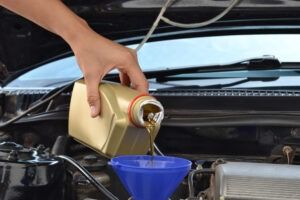Winter Car Care Tips
Winter is here, you’ve turned your heater on and prepared your house, and now it’s time to make sure your car is ready. The oncoming cold air can affect your vehicle in various ways. Some of these effects are damaging, some inconvenient, and all are avoidable if you take the right precautions. Items we will be going over are:
- Lighting
- Battery
- Coolant
- Gas
- Tires
- Defroster
Some cars might already have precautions built in them to avoid what we will say, so keep that in mind as you read. If you aren’t sure if your car has these precautions or you experience any of these issues, please reach out to Spectra Auto Services at (301) 695-5990 , and we will take great care of you and your vehicle.
Lighting. One significant hazard with winter is that the sun sets earlier, so the temperature drops much faster, and there is less light on your way home. Due to this lack of light, you’ll want to make sure all of your vehicle’s lights are in excellent shape. If a bulb is out, the time is urgent to fix it.
Something else to look out for is if there’s snow covering any exterior light, then you’ll want to remove that before you drive anywhere. If your headlights are foggy or yellow, you’ll want to get that cleared or checked by an auto service shop.
Battery. Your vehicle’s battery is hit hard when freezing temperatures come. Cold temperatures reduce its cranking power. In fact, at about 0 degrees Fahrenheit, a battery has only about half the power it has at 80°.
Thanks to this, a battery that’s almost inadequate during the summer could turn into a dead battery during the winter. Preforming a volt test performed on your battery will make sure it’s still in optimal condition. If it isn’t, then you’ll need a new battery. This will help you not worry about being stranded or left in a cold parking lot with a car that won’t start. Being stranded in the middle of a snowstorm is not where you want to be this year.
Coolant. Commonly referred to as antifreeze is tremendously important because it keeps your car’s engine from freezing in cold temperatures. Make sure your vehicle isn’t low on coolant and that any leaks are mended in your vehicle’s engine.
Gasoline and Washer Fluid. What do these two have in common? They’re two automotive items you should try your best to keep full this winter. A full tank may prevent water from freezing inside your fuel pump. Gas is also needed if you get stranded because it can help you stay warm by allowing the engine to stay running. A full washer tank helps immensely as messy road debris from a snowstorm can get stuck on the windshield.
Tires. Be sure your tires are up to road standards. This is important during any season, but with winter, your tires can be the difference between you and a ditch.
It’s also important to keep track of your tire pressure as temperatures get colder. Tire pressure drops with the temperature, losing up to one pound per square inch with every 10-degree drop in air temperature. Driving with low tire pressure causes premature tire wear which could lead to a significant accident. Your car will also handle better with correct tire pressure.
Defroster and Climate Control. Make sure your climate control and defroster are working properly and that their ventilation is clear and adequate, producing heat. This is essential so that your windshield is cleared by the time you leave your home. If you leave your home before it is fully defrosted, then you run a major risk for yourself and everyone else on the road.
The post Winter Car Care Tips first appeared on Frederick Auto Repair 21701 | Spectra Auto (301) 695-5990.
Follow us
Spectra Auto Services
Services
List of Services
Follow us
Spectra Auto Services




© 2024 Spectra Auto Services. All Rights Reserved. Website managed by
Shopgenie





